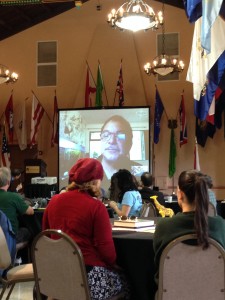Shark finning in Costa Rica: Randall Arauz delivers biodiversity lecture
Randall Arauz, president of PRETOMA, a marine conservation and research organization working to protect ocean resources and promote sustainable fisheries policies in Costa Rica and Central America, spoke via Skype from Costa Rica on Jan. 26 at Stetson University College of Law in Gulfport, Florida. Arauz’s talk was the first of three public lectures scheduled for the spring semester as part of the Edward and Bonnie Foreman Biodiversity Lecture series.
Arauz outlined a series of marine conservation efforts that he started in the 1990s and continues today. In 1999, Arauz shut down green turtle slaughter and successfully protected sea turtle nesting beaches in Costa Rica. After witnessing the horrors of shark finning, Arauz launched a campaign in 2001 to end the practice. His work has had an impact on policies on a domestic, regional and global scale. Costa Rica, once the hub of the Eastern Pacific shark fin industry, became a shark conservation leader, although challenges to conservation remain.
In 2015, Arauz and his colleagues uncovered the illegal export of hammerhead shark fins in a Costa Rican airport that resulted in bans by American Airlines and UPS on transporting shark fins.
Arauz has been praised by world leaders for his shark conservation efforts. He was honored with the Whitley Fund for Nature Gold Medal in 2004, spoke at the United Nations, and received the Goldman Environmental Prize in 2010.
In February, he is participating in an international shark meeting in Costa Rica being held under the auspices of the Convention on the Conservation of Migratory Species of Wild Animals (CMS).
According to a CMS fact sheet, “Sharks are highly vulnerable to overexploitation as they grow slowly, mature late and produce very few offspring. The rapid and largely unregulated increase in target fisheries and by-catch have depleted many populations of sharks and rays worldwide. It is estimated that 63 to 273 million sharks are killed per year.”
“We’re here to change the situation for the sharks,” Arauz told the audience.
Stetson’s next biodiversity lecture is scheduled for March 1 at 12 p.m. in the Great Hall on the Gulfport campus. Dr. Anne Meylan, senior research scientist in the Marine Turtle Research Program of the Florida Fish and Wildlife Conservation Commission, will speak on seat turtle conservation efforts.
Post date: Jan. 27, 2016
Media contact: Kate Bradshaw
[email protected] | 727-430-1580
